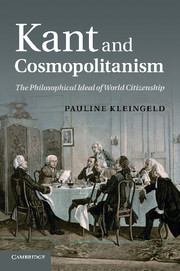Book contents
- Frontmatter
- Contents
- Acknowledgments
- Abbreviations and main primary texts
- Introduction
- Chapter 1 Kant and Wieland on moral cosmopolitanism and patriotism
- Chapter 2 Kant and Cloots on global peace
- Chapter 3 Kant’s concept of cosmopolitan right
- Chapter 4 Kant and Forster on race, culture, and cosmopolitanism
- Chapter 5 Kant and Hegewisch on the freedom of international trade
- Chapter 6 Kant and Novalis on the development of a cosmopolitan community
- Chapter 7 Kant’s cosmopolitanism and current philosophical debates
- Bibliography
- Index
- References
Chapter 7 - Kant’s cosmopolitanism and current philosophical debates
Published online by Cambridge University Press: 05 November 2011
- Frontmatter
- Contents
- Acknowledgments
- Abbreviations and main primary texts
- Introduction
- Chapter 1 Kant and Wieland on moral cosmopolitanism and patriotism
- Chapter 2 Kant and Cloots on global peace
- Chapter 3 Kant’s concept of cosmopolitan right
- Chapter 4 Kant and Forster on race, culture, and cosmopolitanism
- Chapter 5 Kant and Hegewisch on the freedom of international trade
- Chapter 6 Kant and Novalis on the development of a cosmopolitan community
- Chapter 7 Kant’s cosmopolitanism and current philosophical debates
- Bibliography
- Index
- References
Summary
Introduction
In this final chapter, I address more explicitly the significance of Kant’s cosmopolitanism, as reconstructed in the preceding chapters, for current philosophical discussions. Kant is widely recognized as a key figure, whether in discussions of moral cosmopolitanism or in discussions regarding global justice or international political theory. Leading philosophers turn to Kant, whether they propose to “follow Kant’s lead” (John Rawls) or develop their own argument by contrasting it with Kant’s position. In the preceding chapters, however, I have argued that the interpretation of Kant’s position needs serious revision. In this chapter, I consider in more detail how his role in these debates should be recast in light of these results.
Three issues of current debate stand out here. First, Kant’s defense of patriotism as a duty, which is ignored in the literature, offers a compelling response to the persistent objection that Kantian moral theory is unable to give an account of the special obligations that citizens have toward their own states. Kant delivers just such an account. Moreover, as I argue below, moral cosmopolitanism indeed requires an account of the role and scope of special obligations – paradoxical though this may sound.
- Type
- Chapter
- Information
- Kant and CosmopolitanismThe Philosophical Ideal of World Citizenship, pp. 177 - 200Publisher: Cambridge University PressPrint publication year: 2011

